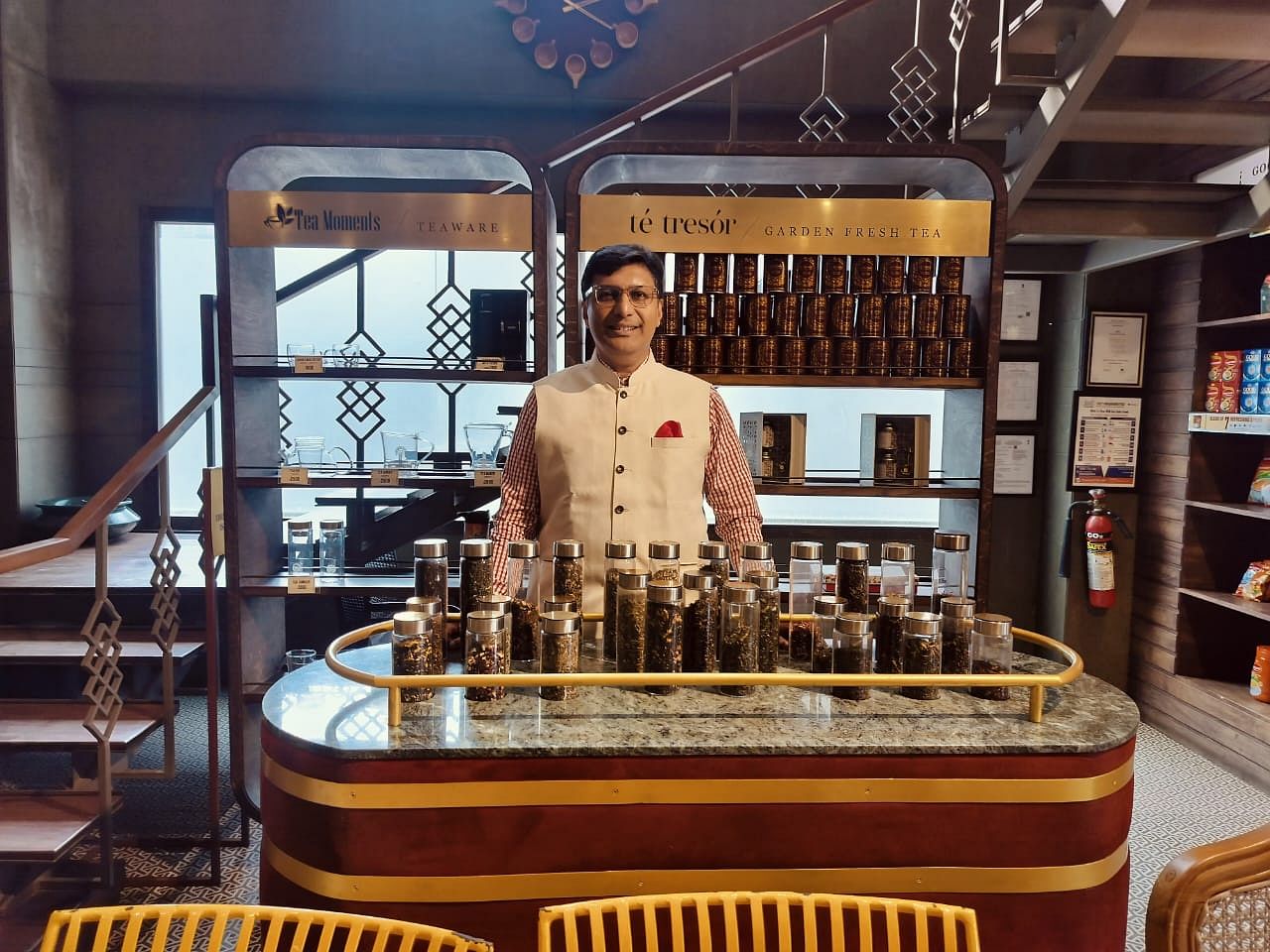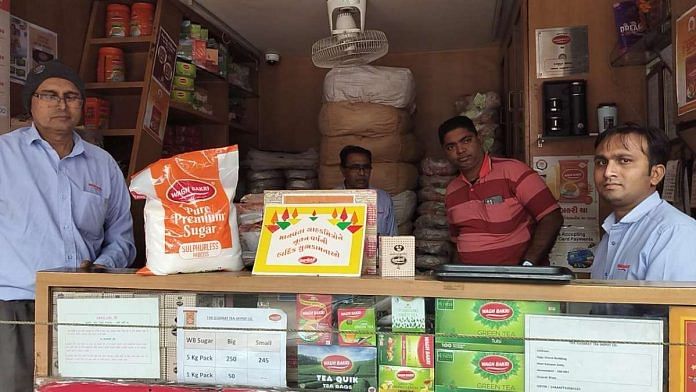Ahmedabad: In a market teeming with colourful packaging, the tea packet — with its black-and-white lettering — stands out. For the customers making a beeline for the Wagh Bakri outlet in Ahmedabad, one of the city’s oldest retail stores, the packaging is almost as much a source of nostalgia, as its contents.
The very-affordable ‘Tea bag No. 23’ — packed with ‘dust tea’, the finely ground powder derived from broken tea leaves — has been a customer favourite for decades. Described as “timeless” by patrons, it’s only sold at select stores in Ahmedabad.
“I have travelled 10 km to buy a 5-kg packet for my father,” said Hansa Ben, a 45-year-old tailor. “We only drink this tea at home.”
Wagh Bakri, founded by Narandas Desai, first rose to fame in the early 20th century among mill workers because of its specialisation in dust tea.
Cut to the present, the teas produced by the 104-year-old Ahmedabad-based company still offer a taste of comfort for Gujaratis even as their appeal has widened far beyond since Wagh Bakri began expanding its market roughly three decades ago.
It primarily remains a tea company but has dabbled in related products like sugar, with newer offerings also including instant coffee and ‘turmeric latte’.
The company earned Rs 2,000 crore in 2022-23, up 7 percent over the previous year, and nearly four times what it earned just a decade earlier.
Over the years, there have been bids to buy the company out, but Wagh Bakri has dug its heels in to maintain its identity, said Paras Desai, the executive director of the company and a fourth-generation proprietor.
“Yes, we’ve had offers. But we’re unwilling to sell our brand, it is our legacy,” added Desai, who took charge of the company last month, after his cousin Parag Desai passed away from a head injury sustained while warding off stray dogs in Ahmedabad.
In an era when commercial success is intertwined with stories of overnight growth, Paras Desai said Wagh Bakri — whose name literally translates to ‘tiger goat’ — “moves with the grace and patience of a tiger and behaves with the humility of a goat”.
“Slow and steady keeps the ship sailing, and business foundations strong and within the family,” he added.
Also Read: How British used Indian Railways, free cups, and targeted women to make Indians tea drinkers
How Wagh Bakri was founded
In 1892, according to Desai, his great-grandfather Narandas Desai purchased tea estates in Darby, South Africa. That was a year before Mohandas Karamchand Gandhi, then a lawyer, arrived in the country.
Both Gujaratis became close allies. Desai said the British construed Narandas’ association with Gandhi and charity work among the Indian community there as treason, and exiled him from South Africa.
“When my great-grandfather was exiled, he filed a case in the courts, which he eventually lost. But the case earned us a time of 15 days during which he sold our tea estates to the French,” Desai said, speaking to ThePrint in a swanky Wagh Bakri tea lounge — one of 29 across India — in Ahmedabad.

But Gandhi didn’t let Desai return home empty-handed, and gave him a signed recommendation letter, praising his work in South Africa.
On the basis of this letter, Desai said, Narandas got a job at a tea estate in Avkali near Mahabaleshwar, Maharashtra.
That job didn’t work out and Desai returned to Ahmedabad. This is the time when cotton mills were at their peak in Ahmedabad, and Narandas and his sons started selling dust tea — the most affordable tea variant — to the mill workers.
It was the birth of Wagh Bakri as the “common man’s chai”.
The name of the brand, Desai said, was suggested to Narandas by a seer as they walked along the banks of the Sabarmati river. It was also partly inspired by Russian circuses, he added, describing shows where a hunter would simultaneously tame a goat and a tiger placed on either side of him.
“We wanted to introduce a tea that was so good that a tiger would forget that he could eat the goat, and the goat would forget that it could be eaten,” said Desai. “Chai would bring different people together, and everyone could forget their differences.”
The first retail outlet came up in 1919, in Ahmedabad’s Kalupur.
Arid, hot Gujarat isn’t a place where tea — which ideally requires moderate heat and humidity — can be cultivated.
So, Wagh Bakri has always sourced its tea from various plantations, and, to this day, doesn’t own a farm.
In the beginning, when the company was still small, Wagh Bakri sourced its tea from local distributors. Today, it buys lakhs of kilograms of tea leaves from estates across the country through auctions. They sell an estimated 47 lakh kg tea every month, according to Desai.
The tea to be sold is selected by tasters employed at various offices in Ahmedabad and Kolkata. The tasting goes through three levels of grading, by juniors, seniors and then the head of the department.
Tea tasters go through tasting as many as 250 samples a day. Wagh Bakri tastes some blends along with milk and sugar to get a sense of what the final product in a typical Indian kitchen would taste like. “It’s not standard across companies to taste tea with milk and sugar in it. But we want to see the colour, smell, taste, and consistency of the tea for our final consumers,” Ketan Shah, who heads the Ahmedabad branch, said.
Every now and then, the Desai family shows up for tasting too.
In Ahmedabad, Wagh Bakri chairperson Piyush Desai is popular as a tea connoisseur, and some residents joke that he could tell you the blend, brand and grade of tea just by smelling it from a distance.
Beyond Gujarat
Paras Desai said the company’s expansion has been a topic of fervent discussion in the family, recalling how, in his younger days, he would sit in on the deliberations.
“Expansion plans are all the family could discuss while sitting together in the drawing room, while eating dinner, while having morning tea,” he said. “I would listen in on all the challenges faced by the family back then, and got well versed with the company in my youth,” he added.
The family’s first step out of Ahmedabad, Desai said, was in Vadodara, then Surat, Navsari, and Saurashtra.
By 1997, Wagh Bakri had established a presence in Rajasthan, and moved into markets in Madhya Pradesh by the next year. In 2001, they were available on shelves in Maharashtra.
Now, Wagh Bakri is available in 24 states, and is exported to more than 60 countries. It has contracts with the Western Railway and with some private airlines. “I was surprised that Singapore Airlines also serves our blend of masala tea,” said Desai. “They’re doing it via another distributor. I didn’t even know!”
When it’s mentioned that Vistara Airlines, a joint venture between Singapore Airlines and Tata — which owns a competing tea brand — also serves Wagh Bakri, Desai grinned. “Everyone loves our quality!” he said.
Among Wagh Bakri’s expansion projects are its tea lounges, which serve different kinds of tea in a premium cafe-like set-up. The idea dates back to 2002, and the first store was opened in Jaipur. However, it failed and was later re-launched in Mumbai.
The tea lounges were sort of a pet project for the late Parag Desai.
Desai said they plan to maintain their “slow and steady” pace of growth, and are not fazed by the fast expansion of some of the newer players in the space.
“Slow and steady wins the race,” said Desai, adding that, by the end of 2023, they aim to open 55 tea lounges across the country.
(Edited by Sunanda Ranjan)
Also Read: Indian tea is world famous, but our exports are still behind Kenya, China and Sri Lanka



